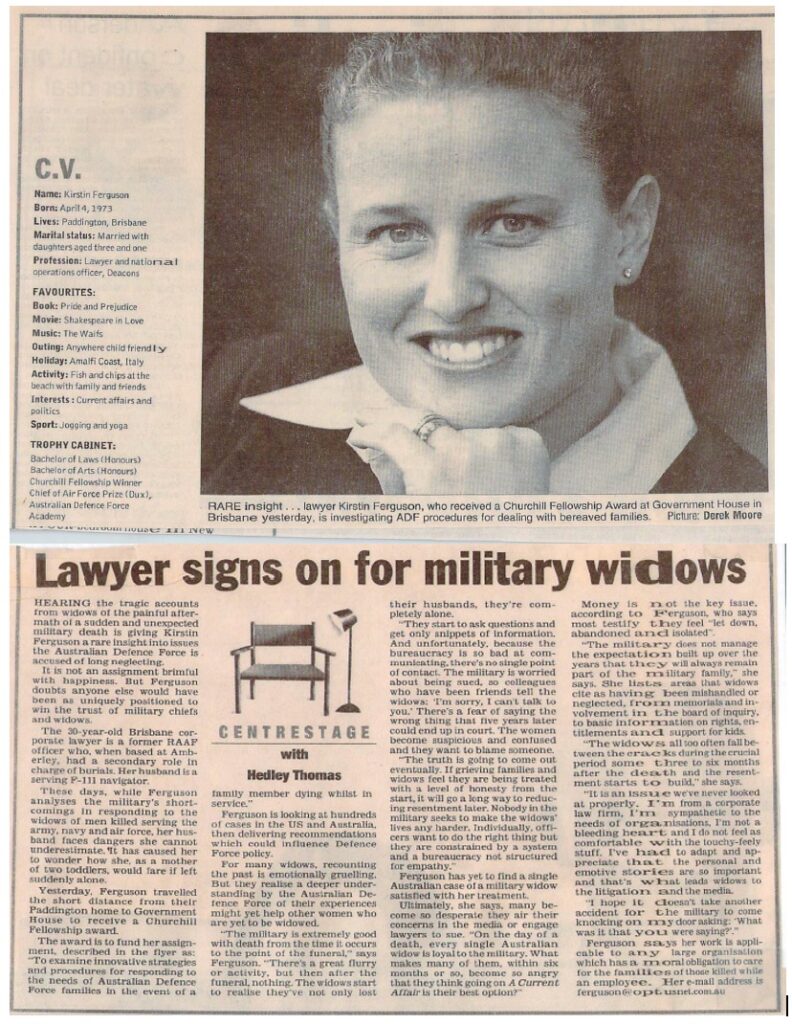
Complete the Head & Heart Leader Scale™ and receive a free, personalised report here.
Complete the Head & Heart Leader Scale™ and receive a free, personalised report here.
Centrestage with Hedley Thomas
16 August 2003
Name: Kirstin Ferguson
Born: April 4, 1973
Lives: Paddington, Brisbane
Marital status: Married with daughters aged three and one
Profession: Lawyer and national operations officer, Deacons
FAVOURITES:
Book: Pride and Prejudice
Movie: Shakespeare in Love
Music: The Waifs
Outing: Anywhere child friendly
Holiday: Amalfi Coast, Italy
Activity: Fish and chips at the beach with family and friends
Interests : Current affairs and politics
Sport: Jogging and yoga
TROPHY CABINET:
Bachelor of Laws (Honours)
Bachelor of Arts (Honours)
Churchill Fellowship Winner
Chief of Air Force Prize (Dux), Australian Defence Force Academy
HEARING the tragic accounts from widows of the painful aftermath of a sudden and unexpected military death is giving Kirstin Ferguson a rare insight into issues the Australian Defence Force is accused of long neglecting.
It is not an assignment brimful with happiness. But Ferguson doubts anyone else would have been as uniquely positioned to win the trust of military chiefs and widows.
The 30-year-old Brisbane corporate lawyer is a former RAAF officer who, when based at Amberley, had a secondary role in charge of burials. Her husband is a serving F-111 navigator.
These days, while Ferguson analyses the military’s shortcomings in responding to the widows of men killed serving the army, navy and air force, her husband faces dangers she cannot underestimate. It has caused her to wonder how she, as a mother of two toddlers, would fare if left suddenly alone.
Yesterday, Ferguson travelled the short distance from their Paddington home to Government House to receive a Churchill Fellowship award.
The award is to fund her assignment, described in the flyer as: “To examine innovative strategies and procedures for responding to the needs of Australian Defence Force families in the event of a family member dying whilst in service.”
Ferguson is looking at hundreds of cases in the US and Australia, then delivering recommendations which could influence Defence Force policy.
For many widows, recounting the past is emotionally gruelling. But they realise a deeper understanding by the Australian Defence Force of their experiences might yet help other women who are yet to be widowed.
“The military is extremely good with death from the time it occurs to the point of the funeral,” says Ferguson. “There’s a great flurry or activity, but then after the funeral, nothing. The widows start to realise they’ve not only lost their husbands, they’re completely alone.
“They start to ask questions and get only snippets of information. And unfortunately, because the bureaucracy is so bad at communicating, there’s no single point of contact. The military is worried about being sued, so colleagues who have been friends tell the widows: `I’m sorry, I can’t talk to you.’ There’s a fear of saying the wrong thing that five years later could end up in court. The women become suspicious and confused and they want to blame someone.
“The truth is going to come out eventually. If grieving families and widows feel they are being treated with a level of honesty from the start, it will go a long way to reducing resentment later. Nobody in the military seeks to make the widows’ lives any harder. Individually, officers want to do the right thing but they are constrained by a system and a bureaucracy not structured for empathy.”
Ferguson has yet to find a single Australian case of a military widow satisfied with her treatment.
Ultimately, she says, many become so desperate they air their concerns in the media or engage lawyers to sue. “On the day of a death, every single Australian widow is loyal to the military. What makes many of them, within six months or so, become so angry that they think going on A Current Affair is their best option?”
Money is not the key issue, according to Ferguson, who says most testify they feel “let down, abandoned and isolated”.
“The military does not manage the expectation built up over the years that they will always remain part of the military family,” she says. She lists areas that widows cite as having been mishandled or neglected, from memorials and involvement in the board of inquiry, to basic information on rights, entitlements and support for kids.
“The widows all too often fall between the cracks during the crucial period some three to six months after the death and the resentment starts to build,” she says.
“It is an issue we’ve never looked at properly. I’m from a corporate law firm, I’m sympathetic to the needs of organisations, I’m not a bleeding heart and I do not feel as comfortable with the touchy-feely stuff. I’ve had to adapt and appreciate that the personal and emotive stories are so important and that’s what leads widows to the litigation and the media.
“I hope it doesn’t take another accident for the military to come knocking on my door asking: `What was it that you were saying?’.” Ferguson says her work is applicable to any large organisation which has a moral obligation to care for the families of those killed while an employee.





